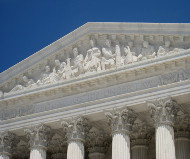Article from: www.thenewspaper.com/news/44/4478.asp
8/4/2014
US Supreme Court To Rule On Cops Who Get Law Wrong
Oral arguments set for US Supreme Court to decide whether a traffic stop is invalid when the police officer is wrong about the law.
 Is a police officer's traffic stop valid if he is wrong about the law? The US Supreme Court announced it would take up that question when it returns in October to hear the case of Nicholas Brady Heien.
Is a police officer's traffic stop valid if he is wrong about the law? The US Supreme Court announced it would take up that question when it returns in October to hear the case of Nicholas Brady Heien.
On April 29, 2009, Surry County Sheriff's Sergeant Matt Darisse was on Interstate 77 when he saw a Ford Escort hit the brakes, and the right-side light did not illuminate. Sergeant Darisse decided to pull over the Ford, which was driven by Maynor Javier Vasquez with Heien asleep in the back seat. After the driver's license came back clean, Sergeant Darisse handed him a warning.
While questioning Vasquez, however, the sergeant became suspicious. Vasquez said he was on his way to West Virginia, but Heien said they were headed to Kentucky. Both Vasquez and Heien consented to a search of the vehicle which turned up cocaine.
The sergeant was wrong to pull over the Ford, as it is legal to drive in North Carolina as long as one brake light is functional. Liberal and conservative groups have joined to urge the US Supreme Court to reject the December 2012 decision of North Carolina's high court, which held that since it had never ruled on the stop light issue and the officer's interpretation was "reasonable," the stop should be considered valid.
The Cato Institute, National Association of Criminal Defense Lawyers and American Civil Liberties Union teamed up to file a friend of the court brief arguing police ought to have the same duty as citizens to know and obey the law. The groups urged the US Supreme Court to uphold the principle that a traffic stop is always invalid when the cop is wrong about the law.
"The North Carolina Supreme Court's rule threatens to undermine law enforcement," the groups wrote. "It understates the importance of legal training for law enforcement officials, as well as diminishing the public perception of law enforcement officials' knowledge and authority."
North Carolina prosecutors argued the single stop light law was "antiquated" and that the Fourth Amendment does not require police officers to be perfect. As long as the suspicion is reasonable, they argued, that was good enough.
"No one disagrees that the officer stopped petitioner's vehicle based upon a reasonable belief of a violation," North Carolina Attorney General Roy Cooper argued last month. "That reasonable belief was dispelled only by a 'surprising' appellate court ruling that for the first time construed a traffic law on the books for more than fifty years to require only one functioning brake light. The Supreme Court of North Carolina correctly ruled that reasonable mistakes of law, like this one, can support reasonable suspicion."
Oral arguments before the US Supreme Court have been set for October 6.
 Is a police officer's traffic stop valid if he is wrong about the law? The US Supreme Court announced it would take up that question when it returns in October to hear the case of Nicholas Brady Heien.
Is a police officer's traffic stop valid if he is wrong about the law? The US Supreme Court announced it would take up that question when it returns in October to hear the case of Nicholas Brady Heien.